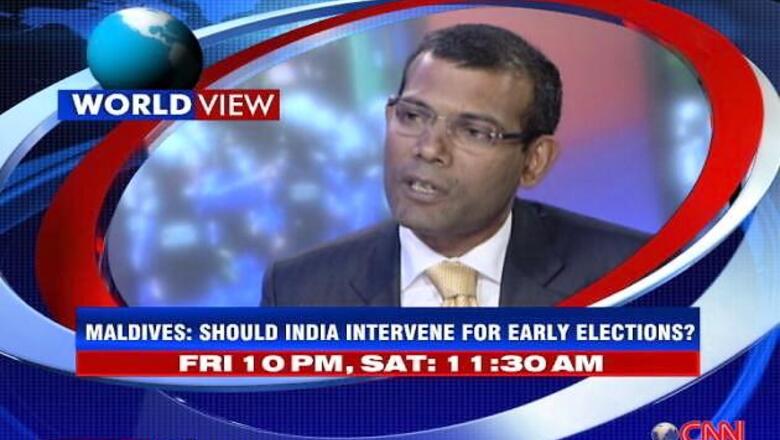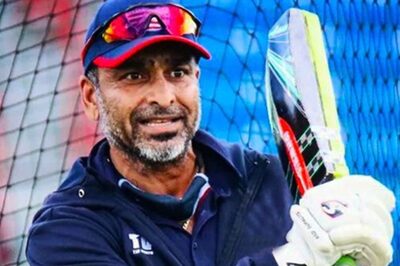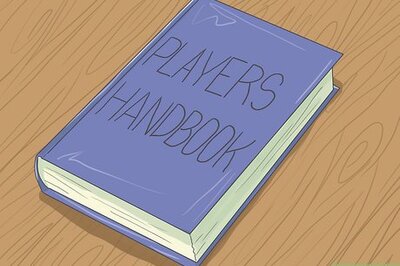
views
Suhasini Haider: Hello and welcome to Worldview with me Suhasini Haider. It's an island in the Indian Ocean that has seen turbulent times and tonight we're talking to two big men locked in battle for the Maldives. In the studio we're pleased to welcome President Mohamed Nasheed, in fact, the ousted President for the moment and we have an exclusive interview with President Mohammed Waheed Hassan as well as we ask that big question in the Maldives, should India intervene for early elections?
Later in the show we'll also take a look at the fall-out of the dramatic attacks in Kabul last Sunday and ask that question: Has America blundered by announcing it's troop pull out? Lisa Curtis of the Heritage Foundation will join us from Washington to discuss that. We'll also have some of that exclusive CNN interview with President Hamid Karzai.
But first to the continued tussle between the new President Waheed and the ousted President Nasheed supporters in the Maldives. That means the future of India's neighbour especially tourism in the country is in peril. Our correspondent Altamash Hashmi travelled to the Maldives for this special report.
Special report
Altamash Hashmi: Two months after the calm was shattered on these beautiful islands, the protests still continue, and Maldives' new President Waheed tell us he's on a mission to quell them.
Mohammed Waheed Hassan: You have seen this country, it is reasonably peaceful and the people are supporting continuation.
Altamash Hashmi: Waheed was the former Vice-President. Accused by his boss, then President Nasheed of conspiring with the military to oust him from power. But Waheed supporters maintain the transfer of power was legitimate and came only after Nasheed resigned in this dramatic TV announcement.
Interviewee:Final court of appeal to say that a coup had taken place and the transfer of power is illegal. Unless and until that is there, the transfer of power will be legitimate.
Altamash Hashmi: In Parliament, President Waheed is still facing daily protests from Nasheed's MDP party members, and on the streets, Nasheed's followers are out on at least five of the eleven islands we visit with him.
It's a tricky situation out here in Maldives, even as the President is travelling to different islands to ensure his popularity is being followed by these MDP supporters. They're asking him to step down and conduct early elections.
It's a demand India, that originally backed Waheed, is also making more forcefully. But holding elections won't be so easy.
Interviewee 2: We love democracy, but now all of our loved democracy Dr. Waheed has stolen.
Altamash Hashmi: The crisis is gradually eating away at the Maldives' lifeline - tourism. Asian tourists mainly from China, that comprises 25% of the market, are staying away.
-------------
Suhasini Haider: And as we said we are joined by President Nasheed, you are in Delhi to meet with the Indian leadership, to put that plea across really for early elections. Many in India would ask, why should India get involved? Why should India even care? What's happening inside the Maldives is essentially an internal matter.
Mohamed Nasheed: Coming to your question why should India be concerned about this at all. We are talking of the Indian Ocean. More than 80% of the trade that comes to India and goes from India actually crosses the Maldives, and if there is instability in the Maldives it is going to of course have serious impacts on India. If we aren't able to have earlier election in the Maldives, the dictatorship with the radical Islamist, who they came to power through this time, they are going to get more entrenched, and it's going to be difficult to dislodge them if you give more time to them. So, I think it's very, very important for the Indian government and the people of India to see that there are early elections in the Maldives.
Suhasini Haider: India can't afford to take its eye off the ball. I'd like you to listen to this interview; President Waheed did speak to our correspondent Altamash Hashmi and particularly on this issue of why he can't hold early elections.
Mohammed Waheed Hassan interview
Altamash Hashmi: What happened on February 7th has been termed by international media as a coup. How would you define it?
Mohammed Waheed Hassan: From our perspective, what happened was really a...then President Nasheed was unable to control the situation. He himself was running the show, but soon he lost control of the situation and he decided that it was time for him to step down.
Altamash Hashmi: Would you say there is a Constitutional arrangement for what happened?
Mohammed Waheed Hassan: According to the Constitution, for any reason, the President is unable to perform his duties, or if he resigns, then the Constitution requires that the democratically elected Vice-President swears in.
Altamash Hashmi: Why do you have so many people from Gayoom's regime back in your cabinet?
Mohammed Waheed Hassan: This is also a misunderstanding. Actually this is not the case. Now, the reason why Mr. Nasheed keeps on saying that we have taken Mr.Gayoom's people is basically to misguide public opinion.
Altamash Hashmi: Are we going to see any early election and if then when?
Mohammed Waheed Hassan: According to the current Constitution, the Presidential term is five years. But within that period, the earliest election that you can hold according to the Constitution is 120 days before the end of the term, and that's going to be in July of 2013. An election earlier than that will mean we will have to revise our Constitution.
Altamash Hashmi: Can we say that the international investments in your country is safe, especially that of India?
Mohammed Waheed Hassan: You see I have said from day one that we will respect all the agreements that we have signed with India. Maybe one or two such agreements have not gone ahead the way people have expected. So, we need to find out what's wrong and what can be corrected in these things.
------------------
Suhasini Haider: Alright President Nasheed, I saw you listening to every word over there, but one of the things President Waheed has said, and in fact this week the President's office has put out a notification saying they expect to hold elections early by July 2013. But that's not early enough for you?
Mohamed Nasheed: Well that's the scheduled elections, that's not the elections that we are talking about. The central issue here is, the people of the Maldives must be governed by a person who they have decided upon. We have to give them the opportunity to decide who should govern them. We had a free and fair election in 2008, and through a coup that government has been overthrown, and we have now a government that is formed through brute force, and we cannot let this situation go.
Suhasini Haider: Alright you're saying they must be able to decide. Yet, the world, if we can go back to the events of that day, the world saw you stepping down on television, saying that you were resigning. A day later you said it was done under force. What was the kind of pressure that you faced?
Mohamed Nasheed: Well there was a mutinous police force outside, and there were sections of the military in league with this police force while I was inside the military headquarters. I was minutes away from being mobbed, and I had to save my life and the life of many, many, many other Maldivians, so I was forced to resign.
Suhasini Haider: Was there no one you could call? Did you ever try to make that call?
Mohamed Nasheed: I did. I rang my National Security Advisor, I told him to ring the Indian High Commissioner, and he did and we explained the situation very clearly to the Indian High Commissioner. I did explain the situation to anyone whom I could. But while I was inside the military headquarters, I couldn't make any calls because the calls were jammed there.
Suhasini Haider: Alright, just a few months before that, you hosted the SAARC summit, we saw you meeting with not just the Indian leadership but the leadership of the region. A year before that you gave an interview talking about your close ties with Prime Minister Manmohan Singh, somebody who listens to you. Why do you think the Indian leadership failed to hear your plea that night?
Mohamed Nasheed: I think there might have been initial reports going from the Maldives to Delhi, certainly someone has got the wrong end of the stick.
Suhasini Haider: In fact, within 12 hours practically of that dramatic resignation, Prime Minister Manmohan Singh sent that statement you were speaking about, congratulating President Waheed. Did you feel disappointed? Did you feel let down?
Mohamed Nasheed: I do understand the difficulties that Indian governments have when dealing with neighbours. I do understand that India must recognise someone everywhere. In any country, whoever has the coffers and the armory, India must recognise these people and be able to deal with them. But, yes we were shocked. I was sad.
Suhasini Haider: And now that you are here in New Delhi, what is it that you expect that they will do. A leadership that didn't hear you a month ago. What are you hoping that they will do now?
Mohamed Nasheed: I've had many conversations with your leadership from then on. I've had many, many telephone conversations, and I am encouraged that they are re-aligning their policies towards what is happening on the ground. And in fact, the foreign secretary Ranjan Mathai did broker a deal with the political parties to have early elections, and he did get signatures of all for this document. And now they're backtracking on the document and this cannot be held. The government in the Maldives must honour it's words to the Indian government.
Suhasini Haider: Let's talk about the situation in your country. Some would say you said you faced pressure from a mutinous army, a violent police force that forced you to resign. Yet a day later, weeks later, we saw you out on the streets openly taking them on. Some would say perhaps there isn't so much of a danger to you if a government is allowing you to come out and protest, is allowing your people to come out and protest. It's a functioning democracy.
Mohamed Nasheed: Well we are more. They try to beat us up everyday, they're trying on it everyday. They've run out of tear gas, they've really exhausted their batons, and people are coming out everyday. More than 65% of the population of the Maldives is below 35, and it was they who brought me to the Presidency, and they are not going to relent.
Suhasini Haider: Alright, you mentioned earlier that you think President Waheed does not lie easily. Who do you think is behind his acceptance of the Presidential position?
Mohamed Nasheed: Gayoom. There's no doubt about that. Even though Dr. Waheed is mentioning that there are no Gayoom loyalists and Gayoom people in his cabinet, just have a look at it. Gayoom's son and his daughters are there, all his cabinet ministers are there, all his associates are there, all his cronies are there. This is Gayoom back again. There's no doubt about that.
Suhasini Haider: You've also hinted, in fact, you said earlier about the fear of Islamic radicalism as a part of it. In fact, part of the opposition to you has always been that you are not taking into account the popular Islamist feeling of your people. What's the real worry here?
Mohamed Nasheed: There is a very, very strong danger of Islamic radicalism taking hold in the Maldives, and it is happening, and we must be mindful of that. The conservative Islamic party fought against us in three elections, in the Presidential elections they lost badly, in the Parliamentary elections they did not get a single seat, in the local council elections they did not get a single seat. But after the coup, they have three Cabinet portfolios.
Suhasini Haider: Serious worries over there from every end. But even so, many would say the real worry for Maldivians is tourism. It's the lifeline of the economy, and what you are doing, taking on the government everyday with these protests, is in fact jeopardising tourism in the country. Wouldn't it be okay for you to say, okay you've resigned, you continue to be a very large part of the Parliament, you have 34 seats over there, you can continue your democratic protests, but wait until the next election, why are you contributing to the political instability of your own country?
Mohamed Nasheed: I am afraid, if we do not have elections now, we will never have an election. We go into a situation like Burma, but worse, we go into a situation like Pakistan where the military calls the shots, and we are never going to have an election.
Suhasini Haider: If you do get your wish to be re-instated, what would you say is the big lesson you've learned?
Mohamed Nasheed: My lesson is, you can get rid of a dictator, but you cannot easily get rid of a dictatorship. The intricacies, the institutions, the culture of it, it takes a long time to flush it out. Now, the lesson is that we have to do it quickly and fast.
Suhasini Haider: Alright. there's no waiting in the Maldives and India needs to act now, that seems to be the message coming from you. President Nasheed, thanks so much for joining us in the studio here on Worldview.
Mohamed Nasheed: Thank you very much.
Suhasini Haider: Now up ahead, we'll go to Washington to speak to Lisa Curtis about just what Sunday's attacks in Kabul mean for the US pullout.
Second Segment
Suhasini Haider: Welcome back to Worldview. Now to our other big story. Afghanistan was stunned by coordinated attacks on Sunday. Nearly 50 people, including all 23 militants were killed but not before hours of RPG attacks, gun battles in Kabul, a suicide attempt at the Jalalabad airport as well. Taliban claimed responsibility, yet, in this exclusive interview to CNN, President Hamid Karzai held NATO responsible for it's intelligence failure.
Hamid Karzai interview to CNN
Hamid Karzai: This is indicative of serious intelligence failure, specially an intelligence failure of our allies and NATO and others. The West has been able to bring Afghanistan a much better health service, better education, better roads, a better economy, but as I have been saying for the last many years, the war on terrorism has not been conducted satisfactorily from the point of view of Afghanistan. There has been a failure in providing security to Afghanistan, or in keeping the Afghan hearts and minds in a manner that would satisfy Afghans.
---------------------------
Suhasini Haider: President Hamid Karzai saying he is simply expressing the Afghan people's anger. Now much of that anger seems to come from US policy in Afghanistan, so we're also asking with this Kabul attack has America blundered by announcing its troop pullout. In fact, we're going to take that question to Washington to the Heritage Foundation's Lisa Curtis.
Lisa you're listening to what President Hamid Karzai is saying. Is this simply more proof that relations between Afghanistan and NATO, Afghanistan and the US in particular are very bad? Is this just proof that things have gone from bad to worse?
Lisa Curtis: Well, I think President Karzai's statement was very unhelpful. The US and Afghanistan are in this messy process of re-negotiating the relationship as the Afghans take the lead for security, the US moves into more of a supporting role. However, I think President Karzai has to keep in mind that his remarks play back in the international capitals which are right now considering how much funding they'll be providing to the Afghan security forces after their departure in 2014. So, he really does have to be careful.
Suhasini Haider: Alright, he needs the support. Even so, some would say the message of these attacks that we've seen, the brazenness of these attacks is very simply that the Taliban is able to come in and strike at will in the heart of Afghanistan; the ISAF, the NATO forces really can't do much about it. Is that the message that's coming through there in Washington?
Lisa Curtis: I think in some ways the attacks probably backfired on the Taliban, because by all accounts the Afghan security forces handled the situation professionally. So I think that even though the Taliban are trying to demonstrate that they still have a capacity to create havoc, they're trying to weaken international will, but I don't think the attacks really succeeded.
Suhasini Haider: Alright, has it been a mistake? Did the US blunder in fact to announce it's pullout so early on in the game, letting the Taliban know that we're not here forever; we intend to pullout of Afghanistan no matter what happens with the security situation there, and here I'm quoting Senator John McCain who said exactly this criticising the President for it.
Lisa Curtis: Frankly the damage was done by President Obama basically signaling that the US was more interested in withdrawing its troops than achieving it's objectives in Afghanistan, and I think the US is going to have to keep forces there even after 2014 to be able to maintain stability in the country.
Suhasini Haider: Alright, interesting point, do you think Sunday's attack is going to change the US administration's pullout plan at all?
Lisa Curtis: I think what's happening now is because we have had some setbacks in Afghanistan over the last few months, that Obama recognises that politically he stands to lose a lot and probably not gain very much by speeding up withdrawals now. So what Obama has said, there won't be anymore troop drawdown announcements until after the US Presidential election, because I think he realises in the midst of some of these challenges in Afghanistan, announcing an accelerated withdrawal would be a liability and would make him look weak on national security in an election year.
Suhasini Haider: Certainly much policy frozen ahead of that election in November, but Lisa Curtis of the Heritage Foundation there in Washington, thanks so much for speaking with us here on Worldview. And that's all we have time for. Log onto Worldview's website, ibnlive.com/worldview. From the team here thanks for watching, we're going to leave you with these pictures ahead of a historic moment next week. Myanmar's newly elected MP, Aung San Suu Kyi was thanking her voters this week ahead of entering Parliament for the first time next week.
####



















Comments
0 comment